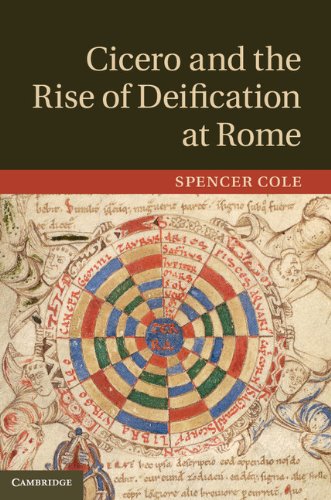Spencer Cole’s Cicero and the Rise of Deification at Rome, marks a substantive contribution to the revolution that has taken place among Classicists and scholars of Greco-Roman religion. Following in the footsteps of Simon Price, among others, Cole seeks to free Roman religion from the modern caricature that it was only concerned with “political” pragmatism. In particular, he argues that “the divinization of humans was a substantial issue of contemporary concern in late Republican Rome, an issue with dimensions that were not solely political” (9). It is within this milieu that Cole situates Cicero, as one who “produced experimental works that grappled with the conceptual challenges posed by deification and [that] diminished the distance between mortals and immortals” (17). For Cole, Cicero’s impact on Roman religion provides the bridge to the Imperial period: “[Cicero] helped create the conditions that gave rise to deification at Rome” (17, emphasis mine).
Moving chronologically through Cicero’s individual works, Cole begins with Cicero’s early conceptions of divinization. He employs Lakoff’s metaphor theory to help elucidate how Cicero’s novel applications serve a wider cultural function: “a conceptual mapping between domains that creates and consolidates connections between humans and gods” (34). One of the off-shoots of this new “conceptual mapping” is the idea that great leaders (that is, servants of the res publica) can achieve immortality—“a final rung on the cursus honorum” (75). In order to bolster this concept, Cicero appeals to a variant of Romulean tradition as reported by Scipio. The point of the tradition is that Romulus’ purported divine ancestry is by far less important than his virtus—the latter being the criterion for his apotheosis to the god Quirinus (92-3). This also has implications for Roman conceptions of the afterlife: “Actual apotheosis as opposed to earthly divine honors is explored here . . . Scipio’s dream is also an inventive formulation of emerging Roman notions of individual identity persisting in an afterlife” (102, cf. 107).
Cole goes on to explore Cicero’s rhetoric in his speeches to Caesar. Within these speeches, he detects “two possibilities for deification [that] are set in tension” (122). On the one hand, Cicero depicts Caesar using the model of the deus praesens; on the other, he continues to explore merit-based apotheosis “contingent upon an illustrious career of civic benefaction” (123). For Cole, the latter appears to win out, as Cicero is able to present divine qualities, especially, clementia, as the means by which divinization can be achieved. The death of Caesar, followed by the manifestation of his comet, demonstrated that he had indeed achieved divinity. When Cicero went to lend his support to Octavian, he did so both by depicting him in terms of a deus praesens, but even more so, by connecting him to his divinized father.
In sum, Cole’s work presents Cicero as an innovative thinker, who continued to adapt and rethink concepts of divinization in light of his personal and political setting. By tracing his work diachronically, Cole is able to show, or, at the very least, postulate, what factors may have influenced stages of development in Cicero’s thinking. In addition, Cole’s project convincingly demonstrates the ways in which Cicero’s innovative thinking provided the sort of “conceptual mapping” that emerges as a prerequisite in later discussions about the emperor’s apotheosis. Finally, it should be noted that by taking Cicero’s language about divinity seriously, Cole is taking a fundamentally different approach to Roman religion than say, Ittai Gradel’s Emperor Worship and Roman Religion (2002). In this way, Cole’s project makes a contribution to the ongoing methodological debate in religious studies about the relationship between literary and material sources.
Bottom line: While Cicero has long been recognized as one of the luminaires of the Roman Republic, Cole advances the case that his writings may also be the key to understanding developments about the apotheosis of the emperor. This book represents a substantive contribution to the study of Roman religion, and, as such, is highly recommended to all!
Review by Max Botner
University of St Andrews



Leave a Reply
Your email is safe with us.